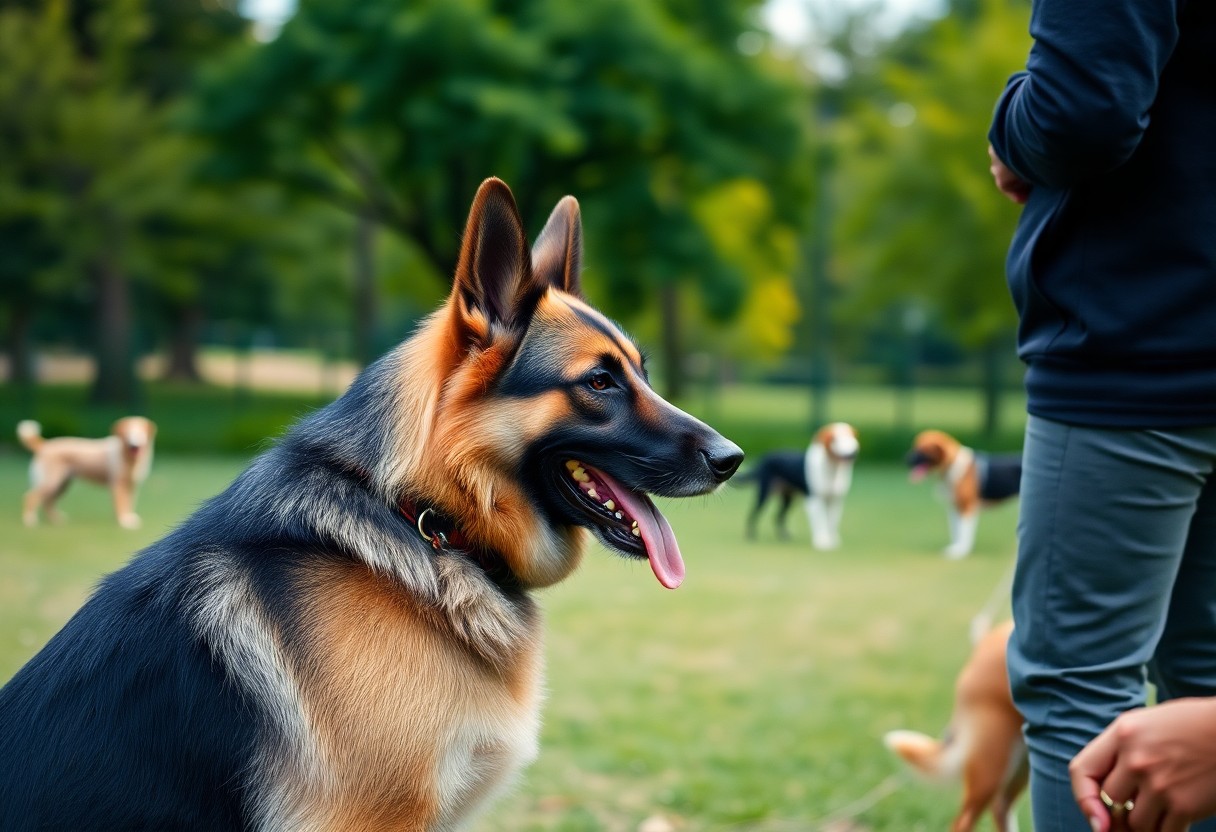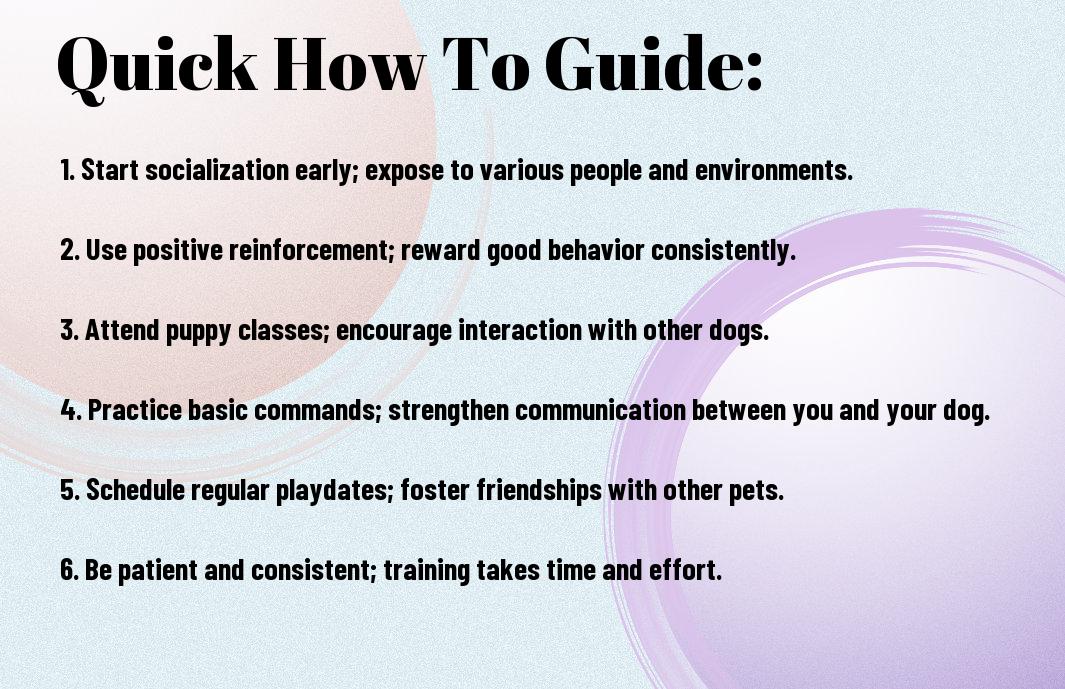Train your German Shepherd for a well-adjusted and obedient pet by mastering the art of socialization and training techniques. I understand how imperative it is to build a strong bond with your dog while ensuring they are confident and friendly in various environments. In this guide, I will share my proven strategies and insights that will help you navigate the world of German Shepherd training, making the process enjoyable for both you and your furry companion. Let’s explore the imperative steps needed to bring out the best in your German Shepherd!

Key Takeaways:
- Consistency is key when it comes to training your German Shepherd. Establish a routine for commands and rewards to enhance learning.
- Engage in socialization by exposing your dog to different environments, people, and other animals to develop a well-rounded temperament.
- Utilize positive reinforcement techniques to encourage desired behaviors, creating a more enjoyable training experience for both you and your dog.
Understanding Your German Shepherd
While every German Shepherd is unique, taking the time to understand their needs, behaviors, and instincts can greatly enhance your bonding experience. These intelligent and loyal dogs require both mental and physical stimulation to thrive. By recognizing their natural traits, you can create a training plan that caters to their strengths and helps address any potential challenges.
Traits and Characteristics
Any German Shepherd owner knows that these dogs have a distinct blend of intelligence, loyalty, and protective instincts. They are often quick learners and thrive on challenges, making them ideal candidates for advanced training. Understanding their strong work ethic and eagerness to please can help you tailor your training approach for the best results.
Importance of Socialization
Understanding the significance of socialization for your German Shepherd cannot be understated. Early and consistent exposure to various environments, people, and other animals fosters confidence and adaptability. This allows your dog to develop into a well-rounded companion, less prone to anxiety or aggression in unfamiliar situations.
This process of socialization is not just about creating a friendly pet; it’s necessary for your dog’s overall emotional development. When you actively expose your German Shepherd to new experiences from a young age, you help reduce the likelihood of behavioral issues later in life. In my experience, dogs that are properly socialized are more relaxed and better equipped to handle everyday situations, making walks, trips to the vet, or interactions with other pets much more enjoyable for both you and your German Shepherd.

Tips for Effective Socialization
Any dog owner knows that socialization is key to raising a well-adjusted German Shepherd. Here are some tips to ensure successful interactions:
- Start socializing your puppy early, preferably before 16 weeks old.
- Expose your dog to diverse people, animals, and environments.
- Use positive reinforcement to encourage good behavior during socialization.
- Attend dog training classes or social groups.
Thou should strive to make socialization a regular part of your training routine.
Early Exposure to Various Environments
Clearly, exposing your German Shepherd to a variety of environments helps them become adaptable and confident. From busy parks to quiet coffee shops, allowing them to experience different situations aids in preventing future anxieties or fears. Aim for a mix of sights, sounds, and smells to ensure they develop a well-rounded temperament.
Positive Reinforcement Techniques
If you want to cultivate good behavior in your German Shepherd during socialization, employing positive reinforcement techniques is highly effective. Reward your dog with treats, praise, or toys whenever they exhibit calm and friendly behavior in new situations.
Tips for successful implementation include keeping training sessions short and fun, maintaining a calm demeanor yourself, and gradually increasing the level of difficulty in socialization scenarios. This forms positive associations with various experiences, which leads to better behavior and a more confident pet.
Training Fundamentals
Unlike other breeds, German Shepherds require structured and consistent training to channel their intelligence and energy effectively. I focus on creating a strong foundation through positive reinforcement methods, ensuring that your pup understands the desired behaviors. This sets the stage for a well-behaved, confident dog that thrives in both social settings and at home.
Basic Commands to Teach Your German Shepherd
Even though German Shepherds are naturally intelligent, teaching them basic commands like “sit,” “stay,” and “come” enhances communication between you and your dog. I find that starting with these simple commands can significantly improve your dog’s responsiveness and help build a solid training routine.
Setting Training Goals
Training goals provide direction and focus for you and your German Shepherd. I set achievable milestones that allow you to track progress and stay motivated throughout your training journey. This not only enhances your dog’s skills but also strengthens the bond between you.
Another effective approach is to establish specific short-term and long-term objectives for your training sessions. Short-term goals may include mastering basic commands, while long-term goals could involve advanced training or public obedience. By breaking down the process into manageable steps, I find that both you and your dog can celebrate small victories, leading to greater overall success and satisfaction in your training endeavors.
Factors Influencing Training Success
Despite the challenges that come with training a German Shepherd, various factors can play a significant role in achieving success. These include:
- Your training techniques
- Your dog’s temperament
- The environment in which training occurs
- Your level of experience as a trainer
Any of these elements can determine whether your training sessions are productive or not.
Consistency and Patience
Training your German Shepherd requires consistency and patience. I’ve found that sticking to a routine helps my dog understand what is expected of him. If you establish clear commands and consistently apply them, your dog will learn more effectively. It’s also necessary to remain patient during the process, as each dog learns at their own pace.
The Role of Exercise
If you want your German Shepherd to excel in training, adequate exercise is necessary. A well-exercised dog is often more focused and receptive to learning. Incorporating a mix of physical activities, such as walks or playtime, can help burn off excess energy that might otherwise lead to distractions during training sessions.
Exercise not only prepares your German Shepherd physically but also mentally, allowing them to be more engaged and less restless. I’ve found that taking my dog for a run or playing fetch beforehand leads to more productive training sessions. Consider incorporating regular exercise into your daily routine to ensure your dog remains balanced and ready to learn.
Advanced Socialization Techniques
For effective socialization of your German Shepherd, consider employing advanced techniques that go beyond basic interactions. Here are a few methods I’ve found beneficial:Advanced Socialization Techniques
|
Group Training Sessions
Training sessions in a group setting can significantly enhance your German Shepherd’s social skills. I encourage you to enroll in classes that offer distractions, as they help your dog learn to remain focused while interacting with other canines and people. This also fosters a sense of community for both you and your pet.
Strategies for Overcoming Fear
While addressing fear-based behaviors requires patience, consistent exposure paired with positive reinforcement can pave the way for success. I recommend starting with calm environments and gradually introducing new experiences to build confidence.
Understanding your dog’s specific fears is the first step to overcoming them. I have found that desensitizing your dog while rewarding small victories can help significantly. By breaking down the situation into manageable parts, you provide your German Shepherd the opportunity to succeed and gain confidence. This proactive approach fosters a stronger bond while cultivating a more balanced, well-adjusted canine companion.
Common Challenges and Solutions
All dogs come with their unique set of challenges, and German Shepherds are no exception. Whether it’s aggression, anxiety, or difficulty in training, recognizing these issues early will help ensure a happy and well-adjusted dog. In my experience, understanding the root causes of these behaviors is imperative, allowing me to apply effective solutions tailored specifically for my dog’s needs.
Dealing with Aggression
Even though German Shepherds are generally friendly, some may exhibit aggressive behavior. The key is to identify triggers and redirect that energy through positive reinforcement and training. Early socialization with other dogs and people can significantly reduce aggressive tendencies. I focus on consistent commands and reward calm behavior, creating an environment where my dog feels safe.
Addressing Separation Anxiety
For many German Shepherds, being left alone can lead to separation anxiety. This can manifest in barking, chewing, or other destructive behaviors. To effectively tackle this issue, I gradually acclimate my dog to alone time, starting with short durations and slowly increasing them. I always make sure to provide distractions, such as toys or puzzles, when I leave, helping ease my dog’s stress and keeping them mentally engaged.
To further assist my German Shepherd in overcoming separation anxiety, I establish a consistent routine for departures and arrivals. This predictability gives my dog a sense of security. I also practice crate training, where I create a safe space that my dog associates with comfort and relaxation. Adding calming aids, like pheromone diffusers, can further enhance their sense of peace. Ultimately, patience and gradual exposure are imperative in helping your dog feel more secure when alone.
Conclusion
Ultimately, effective socialization and training of your German Shepherd require consistency, patience, and positive reinforcement. I encourage you to engage your dog in varied environments, exposing them to different people and animals to build their confidence and sociability. Implement training sessions that are structured yet enjoyable, allowing your German Shepherd to learn and bond with you. By applying these strategies, you’ll foster a well-behaved companion, ensuring a rewarding relationship for both you and your dog.
Q: What are some effective techniques for socializing a German Shepherd with other dogs?
A: Socializing a German Shepherd with other dogs involves a gradual introduction to different canine companions. Start by exposing your dog to well-behaved, calm dogs in a controlled environment, such as a park or a friend’s backyard. Ensure each meeting is positive, using treats and praise to reward your dog for calm behavior. Enroll in obedience classes or dog training groups where your German Shepherd can interact with other dogs in a structured setting. It’s also beneficial to expose your dog to various breeds and sizes to help them become comfortable with different types of dogs.
Q: How can I train my German Shepherd to follow commands effectively?
A: Training a German Shepherd to follow commands requires consistency, patience, and positive reinforcement. Begin with basic commands such as sit, stay, and come, using short training sessions that last 5-10 minutes to keep your dog engaged. Use high-value treats or toys as motivation and always praise your dog for a job well done. Repeat commands periodically throughout the day in real-life situations to reinforce learning. Create a structured environment by maintaining routines for training, feeding, and exercise, as this helps set clear expectations for your German Shepherd.
Q: What role does regular exercise play in the socialization and training of a German Shepherd?
A: Regular exercise is important for the socialization and training of a German Shepherd. This breed is energetic and intelligent, requiring both physical and mental stimulation. Daily walks and playtime not only help your dog release pent-up energy but also provide opportunities for social interaction with other dogs and people. Engaging in activities such as agility training or obedience work can reinforce training skills while providing exercise. A well-exercised dog is often more focused and manageable in training sessions, making the learning process smoother and more effective.
Leave a Reply